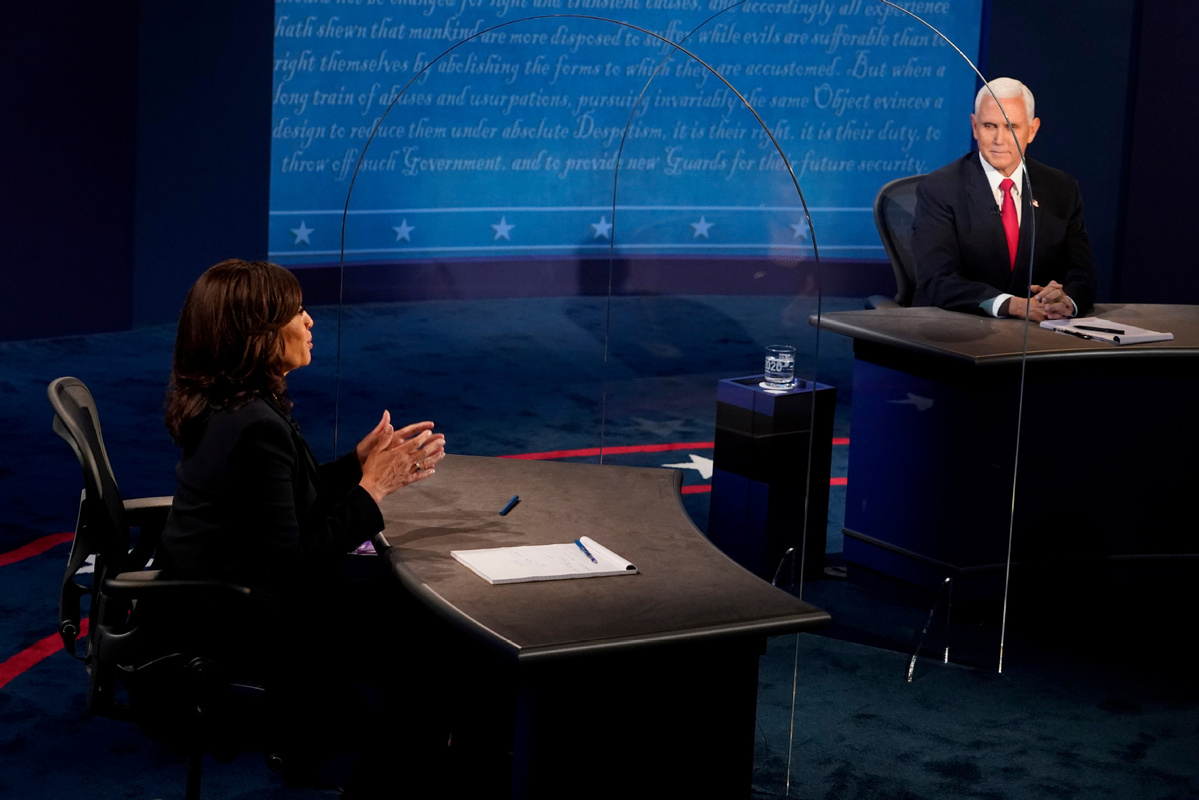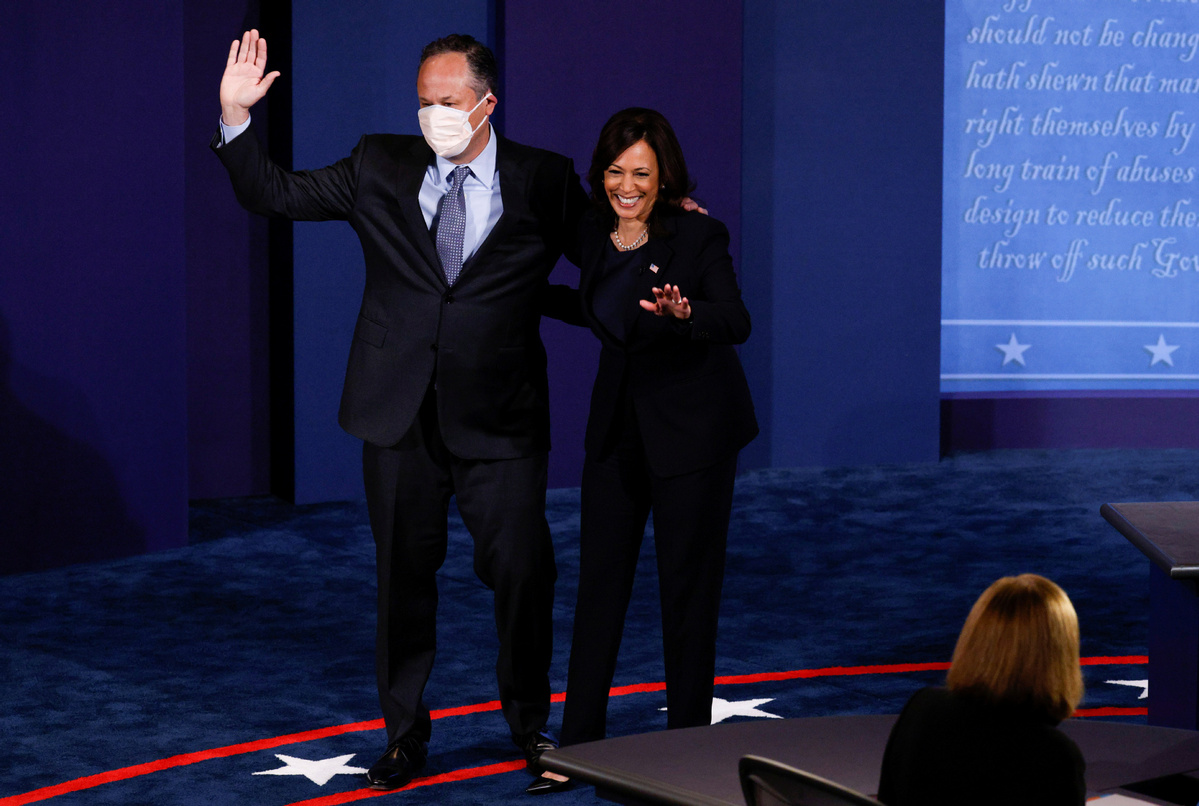Pence, Harris clash in high-stakes V-P debate
By HENG WEILI in New York | chinadaily.com.cn | Updated: 2020-10-08 11:29

The plastic barrier separating the candidates in the vice-presidential debate Wednesday provided a stark reminder of the continued presence of the COVID-19 pandemic in the 2020 campaign.
Vice-President Mike Pence and US Senator Kamala Harris of California met at the University of Utah in Salt Lake City for the only debate involving the second-highest office in the land.
The Plexiglas barrier and the 12 feet of social distance were symbols of the novel coronavirus outbreak, which last week sent President Donald Trump to the hospital for three days, where he was treated for the virus.
The nation has been sharply divided over the approach to pandemic lockdowns, with those divisions falling largely along partisan lines.
Pence, 61, a Republican former six-term US congressman and governor of Indiana, also is in charge of the White House Coronavirus Task Force.
Harris, 55, a Democrat who previously was California attorney general, called Trump's handling of the pandemic the "greatest failure of any presidential administration in the history of our country". She said front-line workers were "treated like sacrificial lambs".
Harris said that on Jan 28, the vice-president and president were informed about the "lethality" of the disease and "they didn't tell you".
"Now you're standing in a food line because of the ineptitude of an administration that didn't tell the truth," she said.
Pence called the administration's effort the "greatest national mobilization since World War II" that saved hundreds of thousands of American lives.
"We believe we will have tens of millions of doses of vaccine by the end of the year," he said.
Of the vaccine, Harris said that "if the doctors tell us we should take it, I'd be the first in line". But she said, "if Donald Trump tells us to take it, I'm not taking it".
Moderator Susan Page, Washington bureau chief of USA Today, asked about the role of the vice-president, considering the age of Trump, 74, and Democratic presidential candidate Joe Biden, 77.

Pence did not answer the question but returned to the pandemic. "We're going to have a vaccine in record time. Have five companies working on it. … Stop playing politics with people's lives. … Your continuous undermining of confidence in a vaccine, it's just unacceptable."
Pence brought up the 2009 swine flu, saying that 60 million Americans contracted it while Biden was vice-president, and if it were more deadly, he said the US "would have lost 2 million American lives".
On the environment, Harris said: "Joe Biden will not ban fracking. … Joe understands that the West Coast of our country is burning … the Gulf states are being battered by storms. … Joe believes in science."
"Let's talk about who is prepared," Harris said. "We will achieve zero emissions by 2050. We will also re-enter the climate agreement with pride," she said in reference to the 2015 Paris climate accord, from which Trump withdrew the US.
"You were the first Senate co-sponsor of the Green New Deal … essentially the same plan you co-sponsored with AOC (New York Congresswoman Alexandria Ocasio-Cortez). We don't need a massive $2 trillion Green New Deal," Pence said.
Harris said Trump's "failed trade war with China" has led to a "manufacturing recession", contending that the US lost 300,000 manufacturing jobs and that farmers have gone bankrupt because of the trade conflict.
The debate was divided into nine, 10-minute segments.
Vice-presidential debates are usually an afterthought for the main event, but this year's seemed more vital in a nation coping with the consequences of the pandemic, blamed in the deaths of more than 210,000 people in the US and the loss of tens of millions of jobs.
"Vice-presidential debates don't usually affect the broader race, but this is an unusual election cycle, so this debate is being closely watched," Cal Jillson, a political scientist and historian at Southern Methodist University in Dallas, told China Daily before the contest.
"This particular debate is more important than most because the first presidential debate was so uninformative, and it is not entirely clear that the two remaining presidential debates will actually be held, given all the uncertainly around COVID."
John Hudak, deputy director of the Center for Effective Public Management at the Brookings Institution, argued that the Pence-Harris faceoff was the most important of its kind since vice-presidential debates began 40 years ago.
Whether Trump is reelected or Biden wins next month, they will be sworn in during a deadly pandemic that has proved to be particularly dangerous to older men.
"Americans will be watching the V-P debate with renewed awareness that one of those two individuals could easily become president — not because they ran for the office but because they succeeded to the office," Hudak said.
Two more presidential debates are scheduled for Oct 15 and Oct 22 before the Nov 3 election.
Zhao Huanxin in Washington contributed to this story.
























